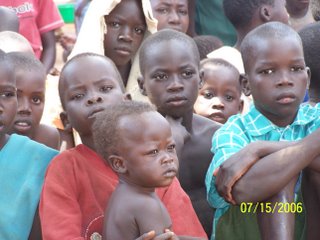This is CrisisOccasionally, God puts us in situations where we are forced to realize that we are truly fortunate, and that the events and challenges that we call problems, are truly minor inconveniences in a sea of ease.
We returned several days ago from two weeks in Africa, mostly in northern Uganda, with a few days in Nairobi, Kenya. We were working with
Child Voice International, a new Christian organization focusing on the child victims of war.
Although I’ve traveled extensively throughout the world, including a fair amount of time in the poorest countries, the time in Uganda provided a fresh dose of reality, of perspective, of gratitude, and of conviction.
UgandaUganda shares with most of Africa the tragic legacy of post-colonial cultural and economic freefall. Actually, the nation has been doing a little better in recent years than many of its neighbors, and because of the influence of the Christian church, it has a better record in its battle with AIDS than much of Africa. (You see abstinence posters everywhere. It’s not a bad word in Uganda).
Thirty years ago, Idi Amin brutalized the nation. When we flew into Entebbe, the world was observing the 30-year anniversary of the successful Israeli rescue of its citizens who were hijacked to Entebbe. Our Uganda guide and friend, however, did not want to talk about it. It is not a proud chapter in Ugandan history.
But now another madman has taken a severe toll on the nation. A deranged rebel spiritualist/terrorist, Joseph Kony, has killed thousands, adducted and enslaved some 30,000 children, and displaced most of the population of two million in the northern provinces of the nation.
One formerly abducted child we met at a transit center, James, had been forced by the rebels to bite his brother until nearly dead, then to beat him to death. At one point in the bush, James took some corn because he was hungry, and a rebel cut off part of his ear because he had not been given permission.
These stories are everywhere. Most families in northern Ugandan have lost a loved one.
When Will They Be Able to Go Home?There shouldn't be malnutrition in northern Uganda, where the soil is fine and the rains are plentiful. But the murderous attacks of the oddly named Lord's Resistance Army have caused most of the two million people in this region to leave their homes and farmland to live in protected internal refugee camps. While these camps are relatively safe, people are crowded into them and diseases are killing thousands of people. And there is no land there for these people to grow their crops. They are kept alive through the help of international aid agencies.
Once the LRA rebels are subdued or give up, it should be safe for these refugees to return to their homes. But will they feel safe? Will they want to return to homes that have often been scenes of horrible crimes?
Thousands of Children Still EnslavedAccording to one source who was abducted at the age of nine and served 10 years as a child soldier, during the which time he became a high-level LRA operative, there are still more than 3,000 child soldiers held by the LRA.
There are
peace talks grinding on in Sudan between the LRA and the Ugandan government. Pray for this peace.
The government has offered amnesty to the butchers of the LRA. It blows your mind, but it fits into a culture of forgiveness, which I’ll talk about another day.
--Jim Jewell

